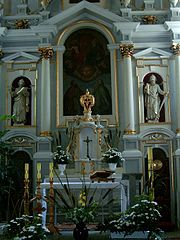
A History Of The Mass And Its Ceremonies In The Eastern And Western Church -Rev John O'Brien A.M.
THE LANGUAGE IN WHICH THE FIRST MASS WAS CELEBRATED
In the time of our Lord three particular languages were common throughout Judea. They were, in some sense of the word, the languages of the world in those days—viz., the Hebrew, Greek, and Latin. The first, better known as the Syro-Chaldaic, or more properly the Syriac, was the language of the greater part of Judea, especially of Jerusalem itself and its environs, and, without a doubt, was the vernacular of our Divine Lord and his Blessed Mother. This can be proved almost to a demonstration, both from the common consent of critics and from the numerous Syriac expressions that we find here and there in the New Testament yet in their original dress, such as “talitha cumi,” “eloi, eloi, lamma sabacthani,” and “ephphetha,” all of which are Syriac, with a few euphonic changes made to suit Greek ears.
The second, or the Greek, obtained a large sway in Palestine also, as St. Jerome testifies (Proem, l. 2, Com. Epist. ad Gal.) and various records show. “And this glory,” says Brerewood in his Languages and Religions, p. 9—“this glory the Greek tongue held in the Apostles’ time, and long after in the Eastern parts.”
The third, or the Latin, had obtained a far wider sway in the Holy Land in the time of our Lord and his Apostles than either of the other two, for it was the language of imperial Rome; and as Judea was a Roman province at that time, and for years previous, it was but natural to expect that the language of Rome would be forced on the conquered people. But as we shall have occasion to treat of these languages more fully a little further on, we dismiss them with these brief remarks, and take up the subject that heads our article, viz.: In what language was the first mass offered?
Eckius, a learned German divine and antiquarian of the sixteenth century, was the first who broached the opinion that Mass was celebrated everywhere, in the beginning, in Hebrew. But this cannot be sustained, for the ablest liturgical writers and linguists hold that in the days of the Apostles Mass was celebrated in the language that prevailed in those places whither the Apostles went to spread the light of the Gospel; hence, that at Jerusalem it was celebrated in Syriac; at Antioch, Alexandria, and other Grecian cities, in Greek; and at Rome, and throughout the entire West, in Latin. As the first Mass, then, was celebrated at Jerusalem, it is an opinion which it would be rash to differ from that the language in which it was offered was the Syriac (Bona, Rer. Liturg., 207; Gavantus, Thesaur. Sacr. Rit., 16, 17; Kozma, Liturg. Sacr. Cathol., p. 111).

 Support Site Improvements
Support Site Improvements